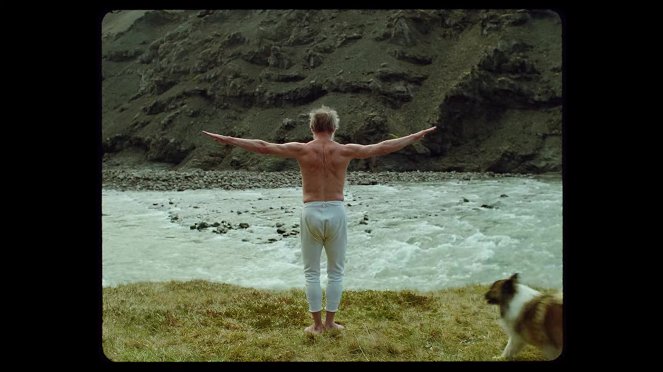Réalisation:
Hlynur PálmasonScénario:
Hlynur PálmasonPhotographie:
Maria von HausswolffMusique:
Alex Zhang HungtaiActeurs·trices:
Elliott Crosset Hove, Ingvar Sigurðsson, Victoria Carmen Sonne, Jacob Lohmann, Hilmar Guðjónsson, Waage Sandø, Ída Mekkín Hlynsdóttir (plus)VOD (2)
Résumés(1)
In the late 19th century, Denmark regards Iceland as its territory, which extends beyond matters of geography and governance to the spiritual health of the population. So Lucas, a Lutheran priest, is sent by the Church of Denmark to establish a parish. Ever an optimist, Lucas believes his faith will guide him, even when he is warned of the obstacles, including a people who may be less than welcoming. Godland makes the most of a breathtakingly austere Icelandic landscape in its story of a man on a singular mission. (Artificial Eye)
(plus)Vidéo (3)
Critiques (5)
Voyage correctement dépeint à travers les paysages sauvages de l'Islande et sans matière goretex. Méditatif, lent, mais d'une atmosphère captivante et fort d'une prémisse narrative solide. Rappelant légèrement le Silence de Scorsese. L'idée même de construire une histoire autour de photographies historiques réelles prises par un prêtre disparu est intéressante. Et Pálmason donne à cela une substance remarquable avec une composition précise dans un format « photographique » en 4:3. Bien que cela ne fasse que suggérer des notions philosophiques, c'est néanmoins intéressant et précieux. ___ Edit: Le créateur a révélé dans des discussions que ces photographies n'étaient pas réelles, euh. Je n'aurais pas attendu une telle approche créative pour ce film en particulier… [KVIFF]
()
Voyager à travers le paysage islandais doit être passionnant et la longueur excessive n'a pas été un problème pour moi dans ce cas-ci. Par contre, là où j'ai un problème, c'est au niveau de la caractérisation des personnages. C'est que l'(anti-)héros principal est un pauvre crève-la-faim inintéressant et qu'après deux heures d'errance dans la nature, ses actions et les contre-réactions des autres personnages dans le dernier sixième du film semblent provenir de nulle part. Je n'ai pas perçu de sens à l'intrigue, même de façon dissimulée. Un spectacle bien filmé, mais dont le contenu laisse à désirer. [KVIFF 2022]
()
Boreland. Unless you analyze it artistically, you won't find the film of the year here, unlike some others. This disgustingly overwrought journey through 19th century Iceland almost put me to sleep, even though it was the very first screening of this year's KVIFF. The development of the characters was vague, the denouement of the conflicting lines felt out of place, I didn't get the reason of the outcome (that escalated quickly). The cinematography is of course beautiful, but you'd have to be a complete moron to fuck up shots of the Icelandic landscape. Objectively, it's not really a two-star film, but I've been running out of patience with unreasonably long runtimes lately, and here the 138 minutes really weren't used effectively. So you’re getting two stars, Hlynur, and search your conscience. (56th KVIFF)
()
The third feature film by Icelandic director Hlynur Pálmason is in many ways reminiscent of Werner Herzog's early work. At the end of the 19th century, Lucas, a Danish priest, sets out to build a church in a remote part of Iceland and encounters not only the untamed landscape, but also the flamboyant guide Ragnar and the specific mood of the local folk. Godland is shot in 4:3 format, which corresponds to the historical background itself – in the introduction we are told that the film is based on seven photographs from that time. It’s precisely the photographic nature of the image that is the strength of the film, which excels in the ingenious creation of contrasts. Lucas leaves the comforts of home and finds himself in an inhospitable land where he’s confronted by the harsh Ragnar, who in contrast is in harmony with his surroundings. However, Pálmason also emphasises the thematic differences with individual shots that also sound contrasting – a group of wandering people lose themselves in the foreground of majestic hills; a long shot of the tired protagonist lying down is followed by the eruption of a volcano. The film takes us to a fascinating land, at once beautiful and haunting, where nature reigns supreme and where priests have no place. Unfortunately, it’s 140 minutes long, often mired in compositions that have only a symbolic function, and completely detached on an emotional level. The development of the relationship between Lucas and Ragnar is inadequately portrayed, and compared to the aforementioned Herzog, the film also limps as a parable about the decline of the human individual. Nevertheless, it is a visually and spiritually stimulating piece that stands out in a quiet hall with a huge screen.
()



Annonces